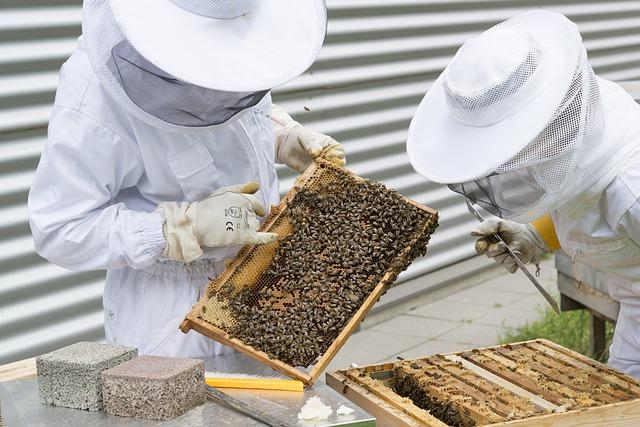Beekeeper-
“Beehives create green spaces where you’d least expect them.“
“The program benefits the airport as well as the honeybees.”

The following written content by Rebecca Maksel
Ben Shertzer, wildlife administrator at Pittsburgh International Airport, has hustled deer off the airfield, removed ducks from the airport’s retention basin, and escorted wayward raccoons from various terminal buildings. But in August 2012, when thousands of honeybees landed on the winglets of a Delta aircraft headed to New York, interrupting refueling and baggage loading, he turned to master beekeeper Steve Repasky and said, “This one’s all you. I’ll stay in the truck.”
It was the fourth swarm Shertzer had confronted in the last few months. In May, roughly 15,000 bees had obscured a light on Taxiway-C, delaying a flight. At that point, Shertzer began Googling nearby beekeepers. He found Repasky, of Meadow Sweet Apiaries, and hired him as a contractor.

Shertzer also began reading up on honeybees. He learned that while some crops can be pollinated by the wind, most need the help of bees; in the United States alone, honeybees pollinate more than $15 billion in crops annually. (An oft-repeated statistic is that Americans owe one in three bites of food to bee pollination.) But honeybee numbers, as many press reports have noted, have drastically declined in recent years. Perhaps, thought Shertzer, the airport could host some hives.
Colony Collapse Disorder was first reported in 2006 by Pennsylvania beekeeper David Hackenberg. Hackenberg transports his hives across the country to pollinate crops: They might travel from Pennsylvania to California to pollinate almond orchards, and then, a few months later, those same hives might be moved to Maine for the blueberry crop, and then to Massachusetts for cranberries. In 2006, Hackenberg had left 400 hives in a field to pollinate Brazilian pepper trees; when he returned to the hives a month later, all but 36 hives had been abandoned. The bees had just disappeared. The phenomenon was happening globally: Beekeepers in China reported losses of 10 percent, and in Italy, almost 50 percent. In each case, the majority of the bees had abandoned the hive, leaving behind the queen and a few infants. Read more from Air & Space
.





